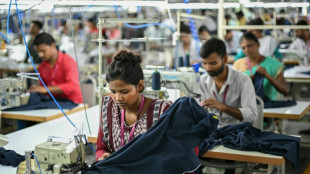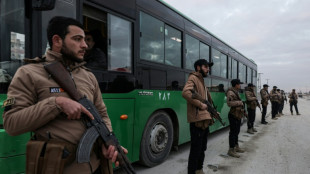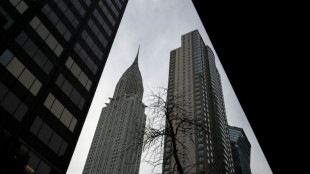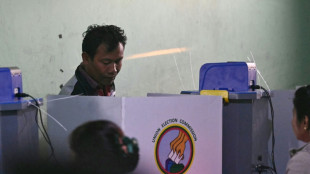-
 Iran rights group warns of 'mass killing' of protesters
Iran rights group warns of 'mass killing' of protesters
-
Demonstrators in London, Paris, Istanbul back Iran protests

-
 Olise sparkles as Bayern fire eight past Wolfsburg
Olise sparkles as Bayern fire eight past Wolfsburg
-
Man Utd knocked out of FA Cup by Brighton, Martinelli hits hat-trick for Arsenal

-
 Troubled Man Utd crash out of FA Cup against Brighton
Troubled Man Utd crash out of FA Cup against Brighton
-
Danish PM says Greenland showdown at 'decisive moment' after new Trump threats

-
 AC Milan snatch late draw at Fiorentina as title rivals Inter face Napoli
AC Milan snatch late draw at Fiorentina as title rivals Inter face Napoli
-
Venezuelans demand political prisoners' release, Maduro 'doing well'

-
 'Avatar: Fire and Ashe' leads in N.America for fourth week
'Avatar: Fire and Ashe' leads in N.America for fourth week
-
Bordeaux-Begles rout Northampton in Champions Cup final rematch

-
 NHL players will compete at Olympics, says international ice hockey chief
NHL players will compete at Olympics, says international ice hockey chief
-
Kohli surpasses Sangakkara as second-highest scorer in international cricket

-
 Young mother seeks five relatives in Venezuela jail
Young mother seeks five relatives in Venezuela jail
-
Arsenal villain Martinelli turns FA Cup hat-trick hero

-
 Syrians in Kurdish area of Aleppo pick up pieces after clashes
Syrians in Kurdish area of Aleppo pick up pieces after clashes
-
Kohli hits 93 as India edge New Zealand in ODI opener

-
 Trump tells Cuba to 'make a deal, before it is too late'
Trump tells Cuba to 'make a deal, before it is too late'
-
Toulon win Munster thriller as Quins progress in Champions Cup

-
 NHL players will complete at Olympics, says international ice hockey chief
NHL players will complete at Olympics, says international ice hockey chief
-
Leeds rally to avoid FA Cup shock at Derby

-
 Rassat sweeps to slalom victory to take World cup lead
Rassat sweeps to slalom victory to take World cup lead
-
Liverpool's Bradley out for the season with 'significant' knee injury

-
 Syria govt forces take control of Aleppo's Kurdish neighbourhoods
Syria govt forces take control of Aleppo's Kurdish neighbourhoods
-
Comeback kid Hurkacz inspires Poland to first United Cup title

-
 Kyiv shivers without heat, but battles on
Kyiv shivers without heat, but battles on
-
Salah and fellow stars aim to deny Morocco as AFCON reaches semi-final stage

-
 Mitchell lifts New Zealand to 300-8 in ODI opener against India
Mitchell lifts New Zealand to 300-8 in ODI opener against India
-
Malaysia suspends access to Musk's Grok AI: regulator

-
 Venezuelans await release of more political prisoners, Maduro 'doing well'
Venezuelans await release of more political prisoners, Maduro 'doing well'
-
Kunlavut seals Malaysia Open title after injured Shi retires

-
 Medvedev warms up in style for Australian Open with Brisbane win
Medvedev warms up in style for Australian Open with Brisbane win
-
Bublik powers into top 10 ahead of Australian Open after Hong Kong win

-
 Sabalenka fires Australian Open warning with Brisbane domination
Sabalenka fires Australian Open warning with Brisbane domination
-
In Gaza hospital, patients cling to MSF as Israel orders it out

-
 New protests hit Iran as alarm grows over crackdown 'massacre'
New protests hit Iran as alarm grows over crackdown 'massacre'
-
Svitolina powers to Auckland title in Australian Open warm-up

-
 Keys draws on happy Adelaide memories before Australian Open defence
Keys draws on happy Adelaide memories before Australian Open defence
-
Scores of homes razed, one dead in Australian bushfires

-
 Ugandan opposition turns national flag into protest symbol
Ugandan opposition turns national flag into protest symbol
-
Bears banish Packers, Rams survive Panthers playoff scare

-
 'Quad God' Malinin warms up for Olympics with US skating crown
'Quad God' Malinin warms up for Olympics with US skating crown
-
India eyes new markets with US trade deal limbo

-
 Syria's Kurdish fighters agree to leave Aleppo after deadly clashes
Syria's Kurdish fighters agree to leave Aleppo after deadly clashes
-
New York's Chrysler Building, an art deco jewel, seeks new owner

-
 AI toys look for bright side after troubled start
AI toys look for bright side after troubled start
-
AI pendants back in vogue at tech show after early setback

-
 Grateful Dead co-founder and guitarist Bob Weir dies aged 78
Grateful Dead co-founder and guitarist Bob Weir dies aged 78
-
Myanmar votes in second phase of junta-run election

-
 'One Battle After Another' heads into Golden Globes as favorite
'One Battle After Another' heads into Golden Globes as favorite
-
Rams survive Panthers scare to advance in NFL playoffs

Saudi Arabia's Economic Crisis
Saudi Arabia, long a symbol of oil-driven wealth, faces mounting economic challenges that threaten its financial stability this decade. The kingdom’s heavy reliance on oil revenues, coupled with ambitious spending plans and global market shifts, has created a precarious fiscal situation. Analysts warn that without significant reforms, the nation risks depleting its reserves and spiralling towards bankruptcy.
The core issue lies in Saudi Arabia’s dependence on oil, which accounts for a substantial portion of its income. Global oil prices have been volatile, recently dipping below $60 per barrel, a level far too low to sustain the kingdom’s budget. The International Monetary Fund estimates that Saudi Arabia requires oil prices above $90 per barrel to balance its national budget. With production costs among the lowest globally, the kingdom can withstand lower prices longer than many competitors, but the prolonged slump is eroding its fiscal buffers. First-quarter oil revenue this year fell 18% year-on-year, reflecting both lower prices and stagnant production levels.
Compounding this is the kingdom’s aggressive spending under Vision 2030, a transformative plan to diversify the economy. Mega-projects like NEOM, a futuristic city, and investments in tourism, technology, and entertainment require vast capital. The Public Investment Fund, tasked with driving these initiatives, plans to inject $267 billion into the local economy by 2025. While non-oil revenue grew 2% in the first quarter, it remains insufficient to offset the decline in oil income. The government’s budget deficit is projected to widen to nearly 5% of GDP this year, up from 2.5% last year, with estimates suggesting a shortfall as high as $67 billion.
Saudi Arabia’s foreign reserves, once peaking at $746 billion in 2014, have dwindled to $434.6 billion by late 2023. The Saudi Arabian Monetary Agency has shifted funds to the Public Investment Fund and financed post-pandemic recovery, further straining reserves. To bridge the gap, the kingdom has turned to borrowing, with public debt now exceeding $300 billion. Plans to issue an additional $11 billion in bonds and sukuk this year signal a growing reliance on debt markets. The debt-to-GDP ratio, while relatively low at 26%, is rising steadily, raising concerns about long-term sustainability.
Global economic conditions add further pressure. Demand for oil is softening due to a slowing global economy, particularly in major markets like China. Saudi Arabia’s strategy of flooding markets to maintain share, as seen in past price wars, risks backfiring. Unlike previous campaigns in 2014 and 2020, which successfully curbed rival production, current efforts may fail to stimulate demand, leaving the kingdom exposed to prolonged low prices. The decision to unwind OPEC+ production cuts, adding nearly a million barrels per day to global supply, has driven prices lower, undermining revenue goals.
Domestically, the kingdom faces challenges in sustaining its social contract. High government spending on wages, subsidies, and infrastructure has long underpinned public support. Over two-thirds of working Saudis are employed by the state, with salaries consuming a significant portion of the budget. Cost-cutting measures, such as subsidy reductions and new taxes, have sparked unease among citizens accustomed to generous welfare. Military spending, including involvement in regional conflicts like Yemen, continues to drain resources, with no clear resolution in sight.
Efforts to diversify the economy are underway but face hurdles. Vision 2030 aims to boost private sector contribution to 65% of GDP by 2030, yet progress is slow. Non-oil sectors like tourism and manufacturing are growing but remain nascent. Local content requirements, such as Saudi Aramco’s push for 70% local procurement by 2025, aim to stimulate domestic industry but may deter foreign investors wary of restrictive regulations. Meanwhile, the kingdom’s young population, with high expectations for jobs and opportunities, adds pressure to deliver tangible results.
Geopolitical factors also play a role. Recent trade deals, including a $142 billion defence agreement with the United States, reflect Saudi Arabia’s strategic priorities but strain finances further. Investments in artificial intelligence and other sectors are part of a broader push to position the kingdom as a global player, yet these come at a time when fiscal prudence is critical. The kingdom’s ability to navigate these commitments while addressing domestic needs will be a delicate balancing act.
Saudi Arabia is not without tools to avert crisis. Its low production costs provide a competitive edge, and its substantial reserves, though diminished, offer a buffer. The government has signalled readiness to cut costs and raise borrowing, potentially delaying or scaling back some Vision 2030 projects. Privatisation and public-private partnerships could alleviate fiscal pressure, as could a rebound in oil prices, though the latter seems unlikely in the near term. The kingdom’s bankruptcy law, overhauled in 2018, provides a framework for restructuring distressed entities, potentially mitigating corporate failures.
However, the path forward is fraught with risks. Continued low oil prices, failure to diversify revenue streams, and unchecked spending could deplete reserves within years. A devaluation of the Saudi riyal, pegged to the US dollar, looms as a possibility, which could trigger inflation and unrest. Political stability, long tied to economic prosperity, may be tested if public discontent grows. The kingdom’s leadership must act decisively to reform spending, accelerate diversification, and bolster non-oil growth to avoid a financial reckoning.
Saudi Arabia stands at a crossroads. Its vision for a diversified, modern economy is ambitious, but the realities of a volatile oil market and mounting debt threaten to derail progress. Without bold reforms, the kingdom risks sliding towards financial distress, a scenario that would reverberate across the region and beyond. The coming years will test whether Saudi Arabia can redefine its economic model or succumb to the weight of its own ambitions.

US: Trump begins mass deportations!

Truth: The end of the ‘Roman Empire’

Stargate project, Trump and the AI war...

Europe, Germany and the end of the euro?

DeepSeek: The AI everyone is talking about...

Germany: Migration reform package

Trump needs to avoid debt Collapse

The Roman Empire and its downfall?

Argentina, Milei and the US dollar?

Is this Europe's plan for China?

Donald J. Trump: America is back



